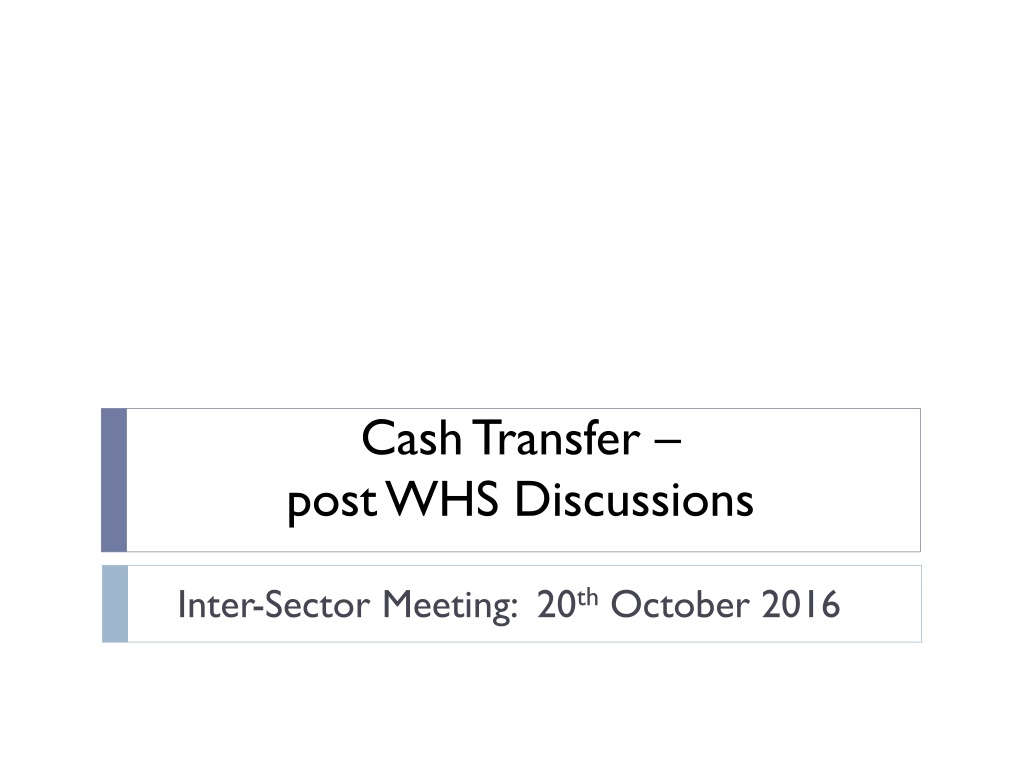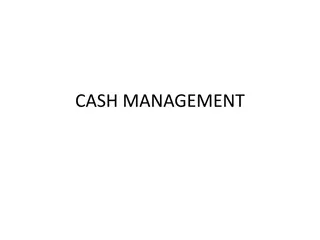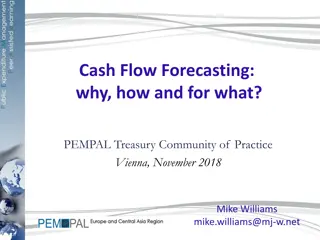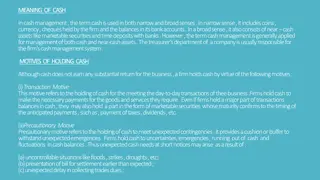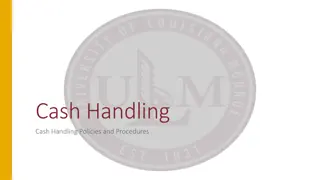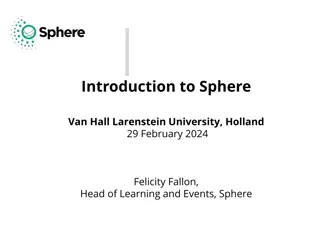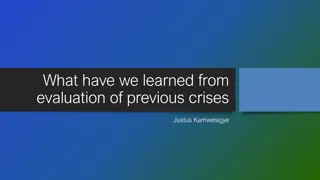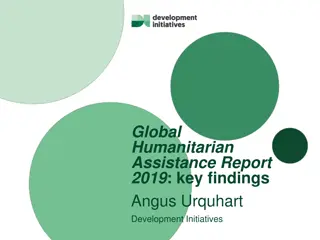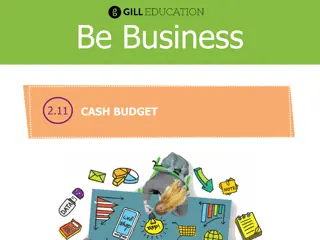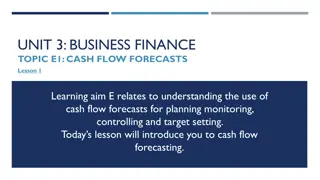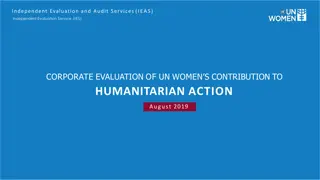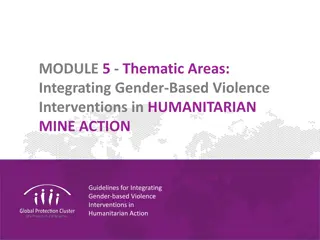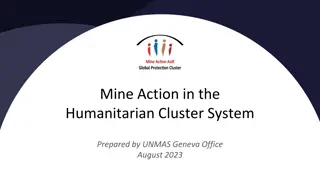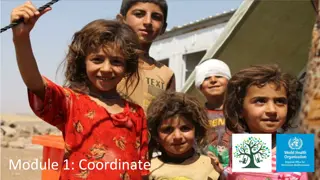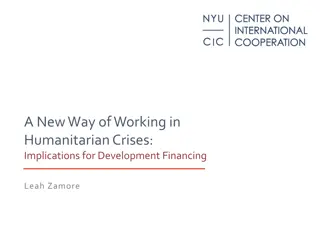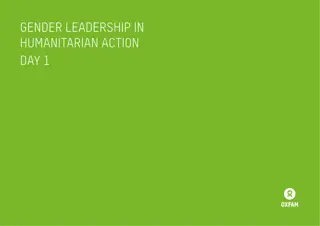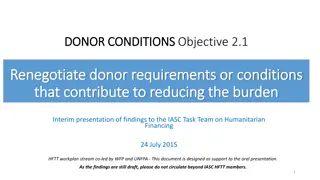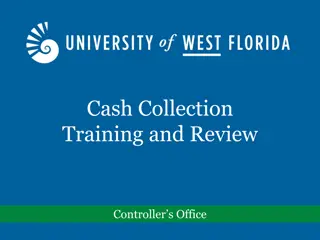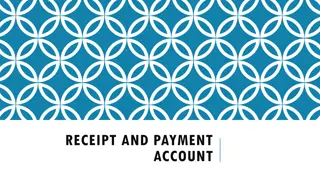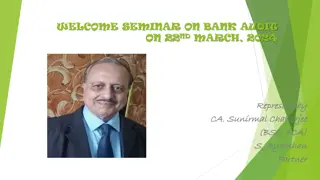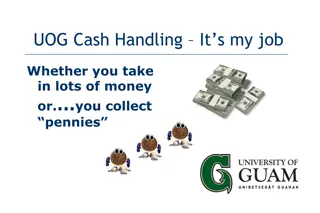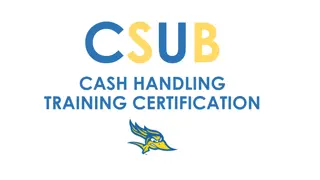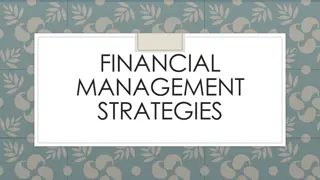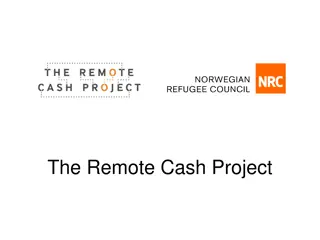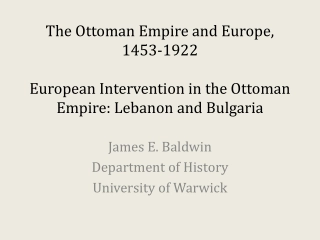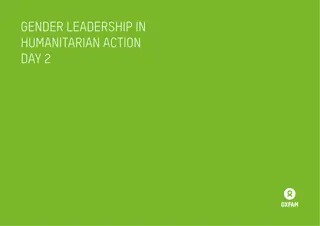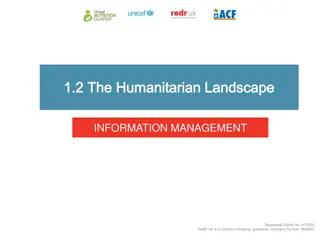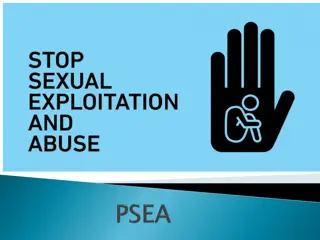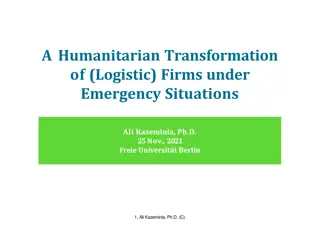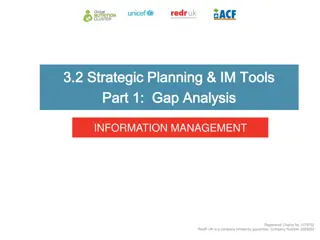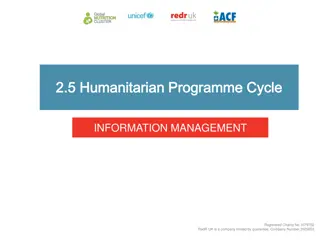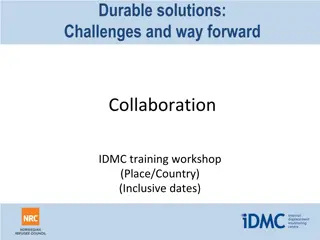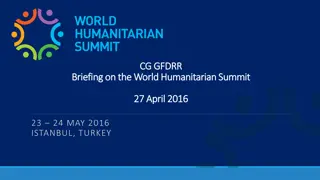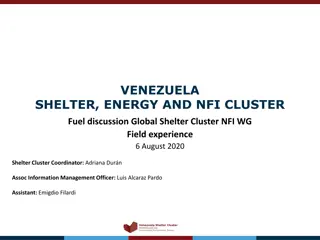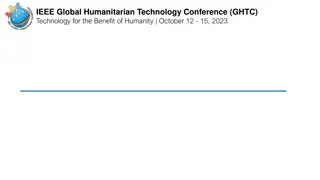Innovations in Humanitarian Cash Programming
Explore updates from the Cash Working Group meeting discussing global updates on cash, private sector engagement, donor projects, and Grand Bargain commitments. Topics include coordination mechanisms, terminology development, preparedness projects, and increasing the use of cash alongside other tools in humanitarian assistance.
Download Presentation

Please find below an Image/Link to download the presentation.
The content on the website is provided AS IS for your information and personal use only. It may not be sold, licensed, or shared on other websites without obtaining consent from the author. Download presentation by click this link. If you encounter any issues during the download, it is possible that the publisher has removed the file from their server.
E N D
Presentation Transcript
Cash Transfer post WHS Discussions Inter-Sector Meeting: 20thOctober 2016
Topics Global updates on cash (including Grand Bargain, WHS Call to Action) Update on cash working group mapping project
Geneva based Cash Working Group Coordination: Map existing cash coordination mechanisms (regional, national, sub- national), and provide recommendations based on best practices and case studies to field actors. Concepts and definitions: Building on the work initiated by a number of actors (e.g. CaLP), to develop and agree on shared terminology and core concepts. Preparedness: Bring learning from inter-agency projects (e.g. DFID funded cash preparedness project) in addition to other organisational initiatives (e.g. IRC) to ensure learning and evidence building. With a particular focus on cash feasibility including best practice, lessons-learned and recommendations for the field. Private Sector and Data Protection: With the proposal of three specific workstreams related to the private sector and cash announced at the WHS, the GbCWG will continue to share progress of these initiatives with the wider humanitarian community ensuring that they feed into existing best practices and experience.
IASC Principals (World Bank Report) Foundational issues Concepts and definitions: The IASC Principals should develop consensus on shared terminology and definitions Systematic equity in consideration: The IASC should agree to equally and consistently consider cash alongside other forms of humanitarian assistance.
Donor engagement on cash 1. DFID Preparedness Project OCHA, WFP, UNICEF, UNHCR Joint cash feasibility to inform strategic decision-making in preparedness and response 4 focus countries Myanmar, Afghanistan, Burundi, Niger 2. ECHO ERC Cash Consortium Project Save the Children, Danish Refugee Council, Mercy Corps, CALP, OCHA Aims to increase multi-purpose cash
Grand Bargain Commitments Increase the routine use of cash alongside other tools, including in-kind assistance, service delivery (such as health and nutrition) and vouchers. Employ markers to measure increase and outcomes. Invest in new delivery models which can be increased in scale while identifying best practice and mitigating risks in each context. Employ markers to track their evolution. Build an evidence base to assess the costs, benefits, impacts, and risks of cash (including on protection) relative to in-kind assistance, service delivery interventions and vouchers, and combinations thereof. Collaborate, share information and develop standards and guidelines for cash programming in order to better understand its risks and benefits. Ensure that coordination, delivery, and monitoring and evaluation mechanisms are put in place for cash transfers. Aim to increase use of cash programming beyond current low levels, where appropriate. Some organisations and donors may wish to set targets
WHS Commitments Commit to increase substantially and diversify global support and share of resources for humanitarian assistance aimed to address the differentiated needs of populations affected by humanitarian crises in fragile situations and complex emergencies, including increasing cash-based programming in situations where relevant. 35% of stakeholders (77 organisations out of 223 committing to any of the core commitments) aligned themselves with this commitment
ensuring that cash is equally considered alongside other response modalities throughout a humanitarian response and that where feasible, cash is used as the preferred and default modality; significantly increasing the amount of funding available to support cash programming, including multi-purpose cash transfers; building internal capacity to carry out cash programming; systematically carrying out joint cash feasibility assessments as part of preparedness. i. ii. iii. iv.
Increase scale (with target) Organisation Target IRC Over the next five years, the IRC is committed to delivering 25% of its humanitarian assistance through cash, up from 6% in fiscal year 2015, and to have active cash transfer programs in 75% of its country offices. United Kingdom The UK commits to more than doubling its use of cash-based approaches in crisis situations from current levels. Islamic Relief by 2018, Islamic Relief expects to ensure that all of its cash-based programming will be in line with sectoral good practice and will increase the proportion of cash-based interventions within its humanitarian programming by 10%. Mercy Corps Mercy Corps aims to scale up cash in 25% of its humanitarian assistance by 2018. UNHCR UNHCR commits to scale up cash assistance where appropriate, with the aim to double the amount of funds programmed for cash-based interventions in aid delivery by the end of 2020. World Vision World Vision will seek to deliver 50% of its humanitarian aid through a multi-sectoral and multi-purpose cash first approach by 2020, where context appropriate, such as in urban settings.
Develop or advocate for the development of coherent strategy for use of cash in humanitarian response By 2020, the Cash Learning Partnership (CaLP) will have contributed to the creation of a shared vision for the humanitarian sector, by advocating with States, Donors, UN Agencies and NGOs for the prioritization of cash based interventions to be disbursed equally to refugees, IDPs and host communities, when needed, to improve their self-reliance and resilience, and increase protection by reducing the risks faced by them. Will do this by: advocacy activities; build the evidence base; build capacity; link cash-based programming with social protection systems; and gender inclusion.
Cash working groups (January 2016) Active cash working group Nepal Myanmar Philippines Jordan Iraq Lebanon oPt Turkey Chad DRC Liberia Sierra Leone Mali Burkina Faso Mauritania Nigeria Somalia Ukraine Afghanistan Pakistan No CWG but exploring Niger Sudan Fiji feasibility study under way Ethiopia plan to establish CWG in second quarter 2016 No CWG, not exploring Syria CAR Cote d Ivoire Colombia Eritrea Of the 29 crisis-affected countries surveyed, 20 had some form of active cash working group, although these varied significantly. Of the nine countries surveyed who do not currently have an active cash working group, four were actively exploring the creation of such a group.
Cash Working Groups (September 2016) Active cash working group No CWG but exploring No CWG, not exploring Syria Cote d Ivoire Eritrea Now there are 24 active Country based CWGs Nepal Myanmar Philippines Jordan Iraq Lebanon oPt Turkey Chad DRC Liberia Sierra Leone Mali Burkina Faso Niger Sudan Burundi Cameroon Columbia Bangladesh (with regional support) Mauritania Nigeria Somalia Ukraine Afghanistan Pakistan CAR Yemen Ethiopia Fiji Geneva based CWG Regional CWGs Four new countries currently exploring country-based groups.
In Conclusion We need to consciously decide to do things differently Why not cash? If not now, when? Shift in focus: Strategic Technical... Food Security... Multi-sector
